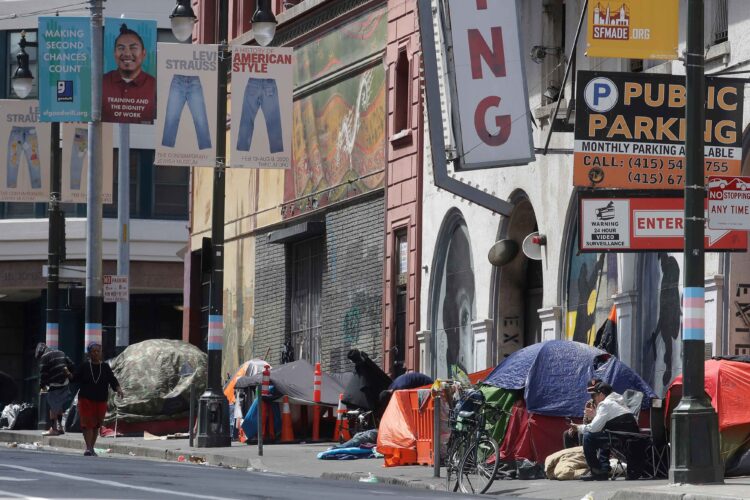Next week, President Joe Biden, Chinese President Xi Jinping, officials of 21 Pacific Rim countries, and hundreds of other dignitaries and CEOs will descend upon San Francisco for the Asia-Pacific Economic Cooperation (APEC) Summit. In preparation for this event, the city of San Francisco has begun clearing away the homeless tent encampments in the area near the event location.
It will be the largest international event the city has hosted since 1945. The city is feeling immense pressure to show the city at its best despite its ongoing drug and homeless crisis. But it is also hampered by a federal ruling, passed by Magistrate Judge Donna Ryu of the U.S. District Court in Oakland, CA in December 2022, that prevents enclosures of homeless dwellings without providing adequate shelter in return.
The city was not able to open new homeless shelters, but it will opt to open its winter shelter program early to accommodate the displaced people. It needs to give people in the encampments a 72-hour notice in order to guarantee safe passage for emergency responders and people with disabilities.
San Francisco Mayor London Breed is up for re-election in 2024, and faces two challengers: SF Board Supervisor Ahsha Safaí and heir to the Levi Strauss fortune Daniel Lurie. They plan to attack Breed on the dystopian reality of the city and its even more dismal future.
Breed’s desired policy is more government spending on social programs: she wishes she could build dozens of shelters across San Francisco for vast sums of money, transforming hotels into state housing facilities. An example of this is Hotel Diva, a 111-year-old structure that was turned into a homeless shelter during the pandemic. The city now owns the hotel, which is a sprawling 122-unit public housing project.
As the San Francisco Chronicle explains, Breed faces a “doom loop” scenario, defined as “the fear that interconnected trends in the city — empty businesses, declining tax revenue, reduced services, wary visitors — could create a vicious cycle that reinforces itself.”
“I think (San Francisco’s) poor reputation stems from the lack of leadership of this mayor,” Safaí told the SF Chronicle. “This is not something that just happened overnight.” Breed, on the other hand, claims her homeless program is going great and the only problem is a lack of acknowledgment. Speaking to the Hotel Diva staff and city workers, Breed said San Francisco’s efforts on the homeless problem “needs to be communicated just as much as everything else.”
Learn the benefits of becoming a Valuetainment Member and subscribe today!
Meanwhile, remote work is killing the commercial real estate of the city, with a historic office vacancy rate of 34 percent. This is terrible for the city’s business and property tax revenues, and combined with Breed’s expensive public programs is forcing the local government to cut the budget in order to stave off a $500 million deficit, which it is on track to hit by 2026.
It is understated how much San Francisco’s homeless problem is a property problem and in turn a work-from-home, ESG, and wealth stratification problem caused by Silicon Valley.
As previously reported by Valuetainment, U.S. Treasury Secretary Janet Yellen is scheduled to speak with her Chinese counterpart He Lifeng in San Francisco toward the end of this week about the state of trade relations between the two countries. The talk is meant to help repair relations in preparation for the APEC Summit and Biden’s meeting with Xi next week.
Yellen outlined her intended discussion points in an op-ed for The Washington Post, among them being China’s “unfair economic practices” such as its “large-use of non-market tools,” its “barriers to market access” and “its coercive actions against U.S. firms in China.” The Chinese official is likely to criticize America’s technology bans on advanced microchips and related export controls.
The U.S. defends its commodity regulations on the basis of national security, claiming they are not so much intended to hurt the Chinese economy so much as they are designed to prevent its military from creating advanced weaponry. The Pentagon recently published its annual report on China’s militaristic development, this time raising the alarm that its ambitions are slowly becoming a reality. By 2049, China wants to “reunify” with Taiwan and use its massive military to “rejuvenate” its empire. One of the major ways the Biden administration, quietly following the Trump administration’s direction, intends to fight back against Chinese militaristic development is through the diversification of American production and the cessation of America’s over-reliance on Chinese factories.
China’s unfair market practices “have resulted in the overconcentration of the production of critical goods inside China,” Yellen wrote in her opinion piece. “The United States, along with our allies and partners, has been taking well-calibrated steps to mitigate this concentration by diversifying our critical supply chains.” The goal, she said, is not to sever ties with China but to create balance and stability in a “volatile world.”


















Add comment